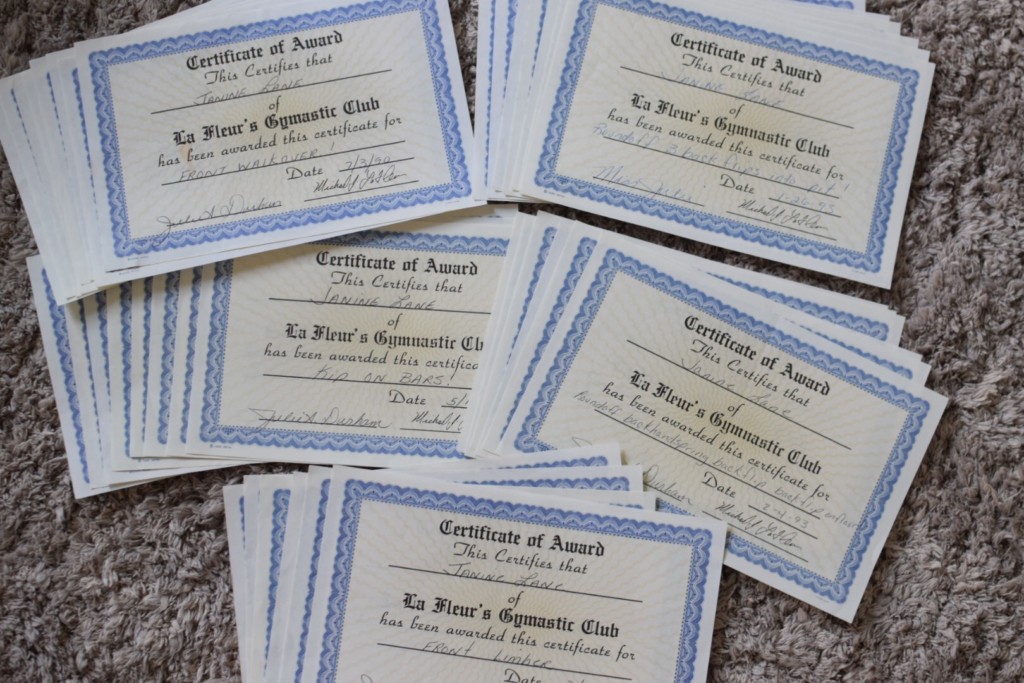Growing up as a competitive gymnast, I looked forward to the day I would have a daughter and enroll her in her first gymnastics class. Now, I’m basking in the experience of watching her run around the gym. She is only 16 months old, but she loves to walk across the balance beam, jump with two feet into the foam pit, and somersault down the cheese mat.
The facility we attend is incredible, the coaches are excellent, and the programs they offer for little ones continue to impress me. Toward the end of our first session, they even had a show for each child to show off their new skills to friends and family. The show was adorable, and at the end, the coaches set up the podium and an impressive backdrop, perfect for a picture-taking opportunity. Then, each child was called up, one at a time, to stand on the first place podium.
And they each received a trophy.
Wait. What? A TROPHY?
Now, I don’t want to discount the incredible job the gym did to make the show a special experience for the kids. But I couldn’t believe the children received trophies. I’m sure other gyms and other sports are doing the same thing. But I couldn’t help but ask myself: How did we get here? How did we get to the point where children simply need to show up to receive recognition and a trophy? I would have been more than happy with a little paper certificate that simply stated that my daughter completed her first gymnastics class. If they wanted to put more details on the certificate, Audrey’s might have said, “Great job having only three tantrums while waiting for your turn today compared to the 15 tantrums you had your first class. You are learning patience!”
 As a child, I received paper certificates each time I learned a new skill. Mine might have said, “First cartwheel!” or “Walked across the high beam!” I’ve kept these tiny notes, and seeing the various milestones brings back many great memories. I worked very hard to accomplish each skill that earned me a certificate.
As a child, I received paper certificates each time I learned a new skill. Mine might have said, “First cartwheel!” or “Walked across the high beam!” I’ve kept these tiny notes, and seeing the various milestones brings back many great memories. I worked very hard to accomplish each skill that earned me a certificate.
If I dig a little deeper in my keepsake box, I will find the medals and trophies I earned for placing in competitions — awards for the hours of hard work I put into my practice at the gym. If I showed up to the competition, did my best, and did not place, I simply received a hug and praise from my coach and family. I learned that although I didn’t “win” that day, I could keep practicing, and I would get better and better. Even if I never placed at a competition, I was learning about making lifelong friends, the discipline it takes to improve, discovering the importance of time management to balance school and practice, being a part of a team, and having fun!
But what if I had been given a trophy for showing up at a competition, or even just practice, for that matter? My daughter will likely receive countless trophies, medals, awards, and ribbons for showing up. I hope I can teach my daughter that while showing up is a great start, to reach your goals and make a difference, you have to put the work in too.
Showing up for gymnastics will not help you master the cartwheel. You have to spend time working on each skill if you want to be better at it.
Showing up at school is not enough to learn to be a great reader. You have to practice and read countless books.
Showing up at work will not teach you to be the best you can be and lead to a raise. You have to commit to your responsibilities, show up on time, seek out opportunities to improve yourself, and do your job well to earn a promotion or raise.
Showing up in a relationship will not lead to a long-term, healthy relationship. You have to invest your time into the other person, maintain open communication, be happy with yourself, and work together to problem solve when challenging times arise.
Simply showing up is a great start, but it’s not enough.
Every parent wants their child to feel special. But isn’t it more important to help our kids learn how to cope with losing when things don’t go perfectly in their particular sport, activity, or hobby? I want to teach my daughter to be resilient and overcome failure with dignity and perseverance. I will comfort her when she learns the difficult lesson that you cannot be the best at everything, and, in fact, you might not be THE best at anything. But you can still be great! And isn’t that the best lesson of all?
How do you navigate the world of over-recognition? How can we teach our children the essential lessons that we learned as kids?














